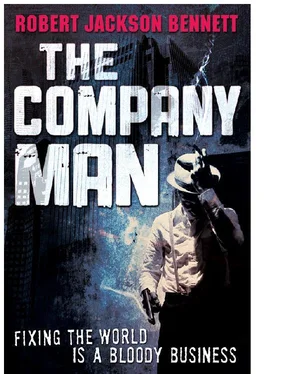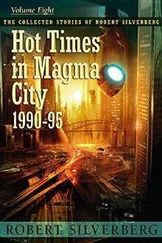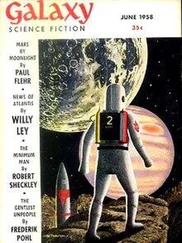Robert Bennett - The Company Man
Здесь есть возможность читать онлайн «Robert Bennett - The Company Man» весь текст электронной книги совершенно бесплатно (целиком полную версию без сокращений). В некоторых случаях можно слушать аудио, скачать через торрент в формате fb2 и присутствует краткое содержание. Жанр: Триллер, на английском языке. Описание произведения, (предисловие) а так же отзывы посетителей доступны на портале библиотеки ЛибКат.
- Название:The Company Man
- Автор:
- Жанр:
- Год:неизвестен
- ISBN:нет данных
- Рейтинг книги:3 / 5. Голосов: 1
-
Избранное:Добавить в избранное
- Отзывы:
-
Ваша оценка:
- 60
- 1
- 2
- 3
- 4
- 5
The Company Man: краткое содержание, описание и аннотация
Предлагаем к чтению аннотацию, описание, краткое содержание или предисловие (зависит от того, что написал сам автор книги «The Company Man»). Если вы не нашли необходимую информацию о книге — напишите в комментариях, мы постараемся отыскать её.
The Company Man — читать онлайн бесплатно полную книгу (весь текст) целиком
Ниже представлен текст книги, разбитый по страницам. Система сохранения места последней прочитанной страницы, позволяет с удобством читать онлайн бесплатно книгу «The Company Man», без необходимости каждый раз заново искать на чём Вы остановились. Поставьте закладку, и сможете в любой момент перейти на страницу, на которой закончили чтение.
Интервал:
Закладка:
Exactly when the city became the center of the New World was hard to say, but many agreed that the 1893 World’s Fair was when it undeniably marked its place in the future. The choice of Evesden as the site outraged the rest of the nation: New York could not believe this frontier dock city had outbid it, and Chicago, hungry after years of denial and condescension, hardly took it any better. And after the Paris World’s Fair and the Eiffel Tower, no one of sound mind could believe this ugly, improvised, industrial city could do anything half so graceful. Surely it would embarrass the country. But when the opening day came and journalists and sightseers gathered before the immense steel gates made just for the occasion, and then passed through and saw the Shifting Sky City and the Crystal Fountain and the Atrium of Arcs, the dissenters fell quiet. Many were moved to tears by the strange marvels silently displayed before them. “I just can’t believe men made such things,” one onlooker was famously quoted as saying, shaking his head. “I just can’t. I never seen such before.”
Evesden defied words, the journalists said. It was beyond description. Many simply called it unworldly. An alien city somehow wedged up on the coastline, something so foreign the mind could barely grasp it.
But the city had its problems as well. More and more laborers flocked to Evesden, hungry to work on the lines, and the city quickly found it could not keep pace. In 1884 it had a population just under nine hundred thousand, yet by 1900 it had six million. Smokestacks soon stretched down the coastline, McNaughton machines making yet more McNaughton products. Slums grew around the factories, disorganized and shabby, flung up in a matter of weeks. Shantytowns were built in the canals and on the pipelines and under bridges, swarming the docks and the train yards. City planners threw up squalid tenements, and after the shanty-dwellers stripped them of glass and plumbing they quickly grew overcrowded by the burgeoning populace, desperate for any place to stay. Corruption followed, feeding off the hunger. A miniature Chinatown sprang up by the piers that came to be known as Dockland, a place with its own laws and its own rules. And as McNaughton expanded, so did the crime rate, reaching first fifty murders a year, then a hundred and fifty, then three hundred, until finally at least four dozen people dropped a month.
Yet even as the city grappled to control itself, McNaughton kept nudging it forward, ever expanding. Products needed to be perfected, redesigned, and put to market. McNaughton Electric and Transportation Division quickly became the forerunner of the corporation, developing several projects a year, from construction equipment to telecommunications to the automobile and the airship. And with each release, thinkers and rivals all over the world wondered about the little old fisherman whose ideas had birthed a company, then a city, and then a world. How machines of such fantastic beauty and awe-inspiring possibility came from such a primitive character became one of the great questions the public was fond of toying with. Kulahee died in 1904, still in the same bed he had always slept in, though with a few more creature comforts that his respectable allowance enabled him to purchase. He took whatever secrets he still had with him. McNaughton himself died in 1912 and left no hint either.
Few gave it thought. The board of directors assumed control after they were both in the ground, nineteen shrewd men who were already worried about McNaughton’s future in the world. As America assumed its place in the twentieth century, it was McNaughton that carried the standard, yet with each passing year its designs became ever more sought after. Word came of foreign companies and even countries that were disassembling McNaughton products and attempting to bribe high-level employees. Designs were abandoned and lost after bitter disputes. Internal movements developed, pressuring the top to spill. When designs for a different make of rifle barrel were leaked in a station in Italy, the board decided enough was enough. How can an empire bring wealth to the world, the company’s leaders asked, if the world will not allow the empire to grow? They chose to answer the question themselves. McNaughton Western Foundry Corporation would arrange security to shepherd its strange little flock, and fight to keep its endless secrets at home and abroad.
CHAPTER FOUR
By the time Hayes got to the lobby of the McNaughton Tower his stomach was still rumbling but his mind was something close to steady. He swallowed, smoothed down his hair, and pushed open the doors and walked in.
The silence of the place was crushing. The lobby of the Nail never felt as much like a business place as it did a tomb. Gray-black pillars marched away from the front doors, all of them smooth and shining in the ghostly light of the lamps, which hung from the columns’ sides like unearthly fruit. Suited figures paced in between the pillars, darting among the shadows to disappear down hidden halls. And high in the center of the lobby was the chandelier, a massive affair of dripping crystal and cruel, cold silver. It shone with a light so harsh and clean it was almost like starlight.
Hayes crossed the forest of pillars to the elevators on the far side and waited before the small bronzed doors. When they slid open the old black elevator man inside favored him with a wary eye and wordlessly motioned him in. Inside it was a tiny, shining coffin with buttons forming a wall of faintly glowing numerals. The old man mashed the one for the forty-seventh floor and they slowly began to rise, gathering speed as they slid through some unknown vein in the building’s skeleton. When they arrived the doors slid open and Hayes stepped out into a small, high marble room, about the size of a very large closet. An orbed lamp hung several feet up, suspended in the shadows of the ceiling. On the far side was a tall metal door with a thick lock set in the frame, and a tin sign at the top of the door read, DENIED. PLEASE PRESENT YOUR KEY.
Hayes turned around and said, “Goodbye.”
The word seemed to die as soon as he said it. The little old man just nodded. Then the elevator doors slid back together and he was gone.
Hayes sighed and walked to the closed door, then reached into his pocket and took out his key. It was not like many other keys: this one was about five inches long and had only one long tooth running along one side. On its surface were about two dozen minuscule dots arranged in a staggeringly complex pattern. A closer look would reveal that they were actually tiny lenses, each no bigger than a grain of sand, and that the end of the key was filled with a thick, clear glass. Hayes had never really been sure how the keys worked. Something about light having to shine through the end and then out through the tiny lenses in exactly the right way. Someone had probably explained it to him once or twice, but it was all math and gearhead talk and he usually tuned out pretty quick.
He walked up to the terminal and put the long key in the lock, fitting the single tooth into the provided slot. There was a whir from behind it and the door unlocked. The sign above flipped over to read, ACCEPTED!-47TH FLOOR and he pushed open the doors to reveal a much larger and grander hall, this one far more Old World than the lobby below, all floral carpeting and smooth dark wood. More suited emissaries paced from one office to another, slick and spotless, men of the moment. Hayes shambled out among them and some stared at him, curious as to why this shabby little man was here, but most of them looked away and went about their business.
It was the quiet that got to him, really. It was like being in church. The Nail was almost a temple, a cathedral dedicated to the sole task of amassing wealth and power. Men passed one another like wandering ghosts, bearing their burdens of paper and numbers, moving from little room to little room and redirecting the fortunes of the greater world outside. And among them stalked Hayes, their keeper and reaper, protector and predator. He was not one of them, he knew that. He was an Ishmael atop Olympus, his hand against every man and every man’s hand against him.
Читать дальшеИнтервал:
Закладка:
Похожие книги на «The Company Man»
Представляем Вашему вниманию похожие книги на «The Company Man» списком для выбора. Мы отобрали схожую по названию и смыслу литературу в надежде предоставить читателям больше вариантов отыскать новые, интересные, ещё непрочитанные произведения.
Обсуждение, отзывы о книге «The Company Man» и просто собственные мнения читателей. Оставьте ваши комментарии, напишите, что Вы думаете о произведении, его смысле или главных героях. Укажите что конкретно понравилось, а что нет, и почему Вы так считаете.












